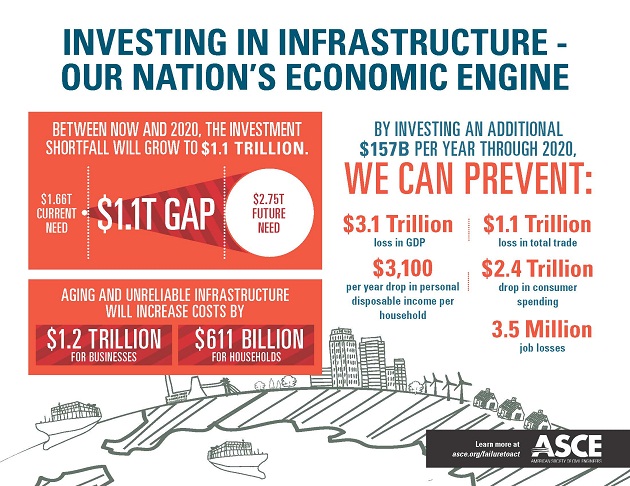Our country has so many urgent needs and two of them are the need for jobs for millions of unemployed people, and the need to upgrade our aging, crumbling infrastructure. Our current policy -- enforced by GOP filibusters of bills to fix the country's infrastructure -- of not fixing our infrastructure to "save money" is starting to cost way more than it saves, and this can only get worse. Hey, I have an idea, why don't we hire unemployed people to fix up our needs-fixing infrastructure, and help get our economy moving again.
"Infrastructure" is the ports, roads, bridges, power grid, water and sewer systems, and other physical systems that provide the underpinnings for our businesses and homes to participate in our economy. The American Society of Civil Engineers (ASCE) regularly does a survey of our infrastructure and provides a report card describing the shape it is in. Since the Reagan tax cuts that forced budget cuts, the work needed to keep our country's infrastructure in good shape has been deferred and deferred. Now it is literally crumbling and holding our economy back.
The cost of holding off on fixing up the infrastructure keeps getting higher and higher.
A new report from the ASCE called Failure to Act, "presents an overall picture of the economic opportunity associated with infrastructure investment and the cost of failing to fill the investment gap."
ASCE’s Failure to Act economic report series shows the economic consequences of continued underinvestment in our nation’s infrastructure, and the economic gains that could be made by 2020 in terms of GDP, personal disposable income, exports, and jobs if we choose as a country to invest in our communities.
This graphic is included as part of their promotion of the report:

This is work that has to be done sooner or later. But right now we also have a jobs emergency. And we also have the lowest borrowing costs in history.
The Cost Of NOT Fixing Our Infrastructure
While there are obvious benefits to fixing up our infrastructure, our current policy of not fixing the infrastructure carries a tremendous economic and social cost. A Washington Post story on the ASCE report, Reports foresee trillion-dollar spending gap for U.S. infrastructure, explains these costs,
If the problem is not addressed, power outages will become more frequent, prices at the supermarket and department store will inch up, traffic will detour around bad bridges, household incomes will drop and millions of people will lose their jobs.
The Post story connects the dots to stories of the economic harm done by an aging infrastructure,
... four days before Christmas in Anne Arundel County [. . .] An explosion at an electrical-power switching station just before 9 p.m. shut down the county’s two major malls. It left normally busy bars and restaurants in downtown Annapolis in darkness. Customers went home, sales were lost and employees on hourly wages lost income. One of the busiest retail evenings of the year was a bust.
Not only do we have to get this done sooner or later, waiting to do it costs money and it also costs jobs -- not the people who would be hired, but people who already have jobs now. The cost of not fixing the infrastructure will be 3.5 million jobs and $3.1 trillion in lost economic output by 2020. Mike Hall explains at the AFL-CIO blog, in the post 3.5 Million Jobs at Stake if Infrastructure Continues to Crumble,
ASCE finds that with an additional investment of $157 billion a year between now and 2020, the United States can eliminate this projected drag on economic growth and protect:
- $3.1 trillion in GDP, almost the equivalent of Germany’s entire GDP.
- $1.1 trillion in U.S. trade value, equivalent to Mexico’s GDP.
- 3.5 million jobs, more than the jobs created in the United States over the previous 22 months.
- $2.4 trillion in consumer spending, comparable to Brazil’s GDP.
- $3,100 in annual personal disposable income.
During the past Congress, President Obama urged lawmakers to approve the American Jobs Act that included a major investment in the nation’s infrastructure, but Senate Republicans successfully filibustered the bill and killed the jobs-creating legislation.
What You Can Do -- Fix The Filibuster
There is something you can do today. You can call your Senators and demand that they Fix the Filibuster Now.
The last attempt to start fixing our infrastructure was the American Jobs Act. Senate Republicans filibustered this bill and killed the effot to both create jobs and fix the infrastructure.
Next week the Senate votes on fixing the filibuster by making them talk all night, instead of silently killing bills. Call your Senators! This is not just about how the Senate works, it is about being able to get things like The American Jobs Act passed. A majority of the House passed it, a majority of the Senate wanted it, a majority of the American people wanted it, but a minority in the Senate was able to block it. Call your Senators and tell them you want to Make Them Talk if they are going to filibuster something!
Call your senators at 1-866-937-5062 and demand change.
--



